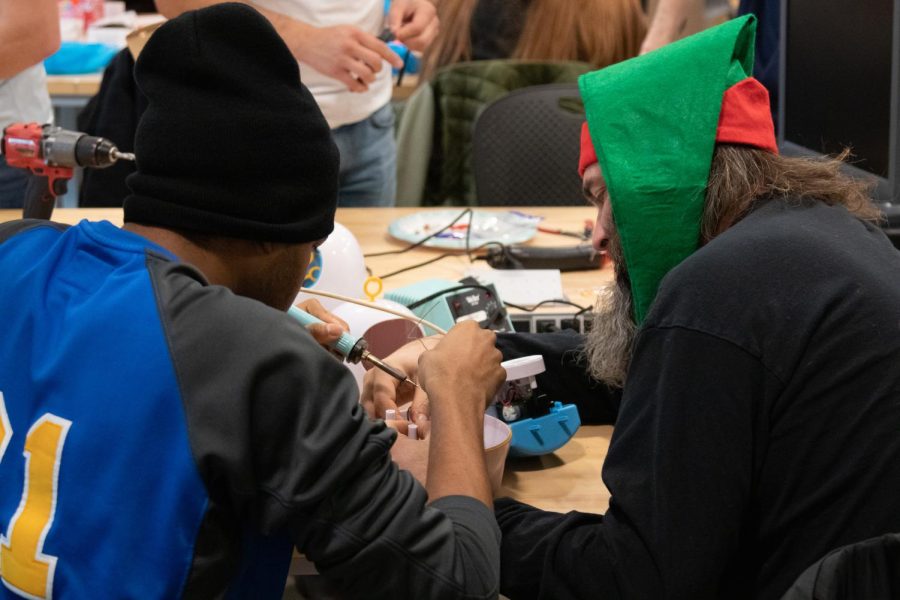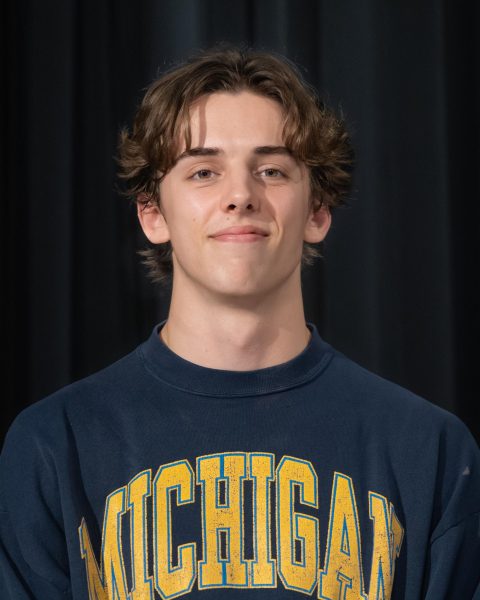For families of children with delayed cognitive or motor development, the toy market can be limiting in terms of both selection and financial availability.
The Marquette College of Engineering has partnered alongside the Penfield Children’s Center to develop and adapt toys to better serve children with varied or limited abilities across Milwaukee County. The center, an institution sponsored by Kohl’s Building Blocks Program, specializes in providing early education and other services to disabled pupils and their families.
The Orthopaedic and Rehabilitation Engineering Center will host the first two Build Days alongside the College of Engineering, titled “Inclusive Play: Toys for All.” The first event took place Saturday, Nov. 12 in the Engineering Hall, and the following is scheduled for Dec. 3.
The first event featured Marquette engineering students working alongside members of FIRST Robotics teams from various high schools around Milwaukee. Marquette students were previously trained by OREC in adapting and rewiring eight traditional toy models to make them more accessible, and were assigned as leaders to teach their techniques to the high school participants.
Molly Erickson runs Go Baby Go! Milwaukee, a program that modifies battery-powered, ride-on cars for children with limited mobility. She conducted Build Days for this program last year for volunteer participants, and adopted a similar formula when planning the Toys for All collaboration with Penfield.
“We wanted to use the [Go Baby Go!] model because we had previous success and loved getting Marquette students involved, but we realized these events would … require more training. That’s when we decided to involve high schoolers, so we worked with FIRST robotics students and assigned each college student a group of younger students to lead,” Erickson said.
The participation of high school robotics team members is one of the most special aspects of this experience for Erickson, who serves as a FIRST robotics mentor for the team that participated Nov. 12.
“We viewed [this event] as an opportunity to bring in some local high schoolers and show them about Marquette. This event was beneficial because of the number of students, and we also really like the opportunity for Marquette students to get involved within the Milwaukee community,” Erickson said.
Erickson believes that the Build Day events and partnership between Marquette and Penfield correlates with the university’s central mission: to promote service and engagement within the larger Milwaukee community.
“Bringing Penfield faculty to Marquette allows them to see what we have to offer, as well as bringing the high schoolers in. We feel it feeds into Marquette’s mission through sending students out, but also bringing community members in,” Erickson said.
Paige Harrill, a sophomore in the College of Engineering and outreach vice president for the Biomedical Engineering Society, was trained by Erickson prior to the event on how to adapt one toy model, in this case a peek-a-boo bear.
“[The process] involved stripping and soldering the wires inside to an aux cord which could be attached to a button or any other form of input,” Harrill said.
Tasked with teaching this method to her assigned group of high-schoolers, Harrill expressed her enthusiasm that the younger students were included within the Build Day events.
“It exposes them to technical skills that even I didn’t know how to do until recently. Being in the Engineering building and having casual interaction with Marquette students is huge and can inspire them to go to Marquette one day,” Harrill said.
In terms of the event’s impact, Harrill expressed her gratitude to have been a part of something that can so dramatically improve a child’s quality of life.
“This experience has meant a lot to me for a variety of reasons. It allowed me to work on my leadership and technical skills while also doing something that will help people. Before this, I never really thought about [how] a toy can make such a difference in a child’s life, and I think it’s really important that adaptations are made to accommodate for those that regular toys just aren’t an option for,” Harrill said.
Vladimir Bjelic serves as a children’s speech-language pathologist at Penfield, and has worked with children for the entirety of his career. He said that the team of professionals and therapists employed at Penfield work to ensure the development of students no matter their cognitive or motor abilities.
“We work with a variety of kids, some with cognitive delays, some with overall developmental delays. Some of these kids have a difficult time engaging with a toy because of their limited ability … specialized toys are available to purchase, but often very expensive, so the collaboration with Marquette engineering will produce the same kinds of toys at a much cheaper cost,” Bjelic said.
Bjelic expects that the production of adapted toys will prove useful in advancing children’s cognitive development, allowing them easier access to tools applicable for both recreation and therapy. The therapy departments at Penfield will be provided 32 of the toys to be used in sessions, and the remaining products will be given to the Penfield Montessori School.
“Our initial goal [through Build Days] is to equip all of Penfield with adapted toys, and for our therapists to employ them in their sessions. We also want to show parents how to better use these toys in home environments for more carryover from the therapy,” Bjelic said.
Bjelic also connected with the speech and hearing clinic within the College of Health Sciences and plans to construct eight toys for the department as well as for the Penfield community. This donation will help the program advance within its understanding of the tools best fit to service those with cognitive developmental delays.
His goal for the Build Days is to produce toys that will make play more accessible for Penfield students, but also advance their development and understanding of their surroundings.
“[We want] to get [the children] to learn, but also to determine how to use some of these adaptations functionally. For example, some of the Penfield families do not have AC in their homes, so if we can teach a child to activate a fan through a button as shown on the toys, it will be useful in real-life situations,” Bjelic said.
This story was written by Fiona Flowers. She can be reached at fiona.flowers@marquette.edu



